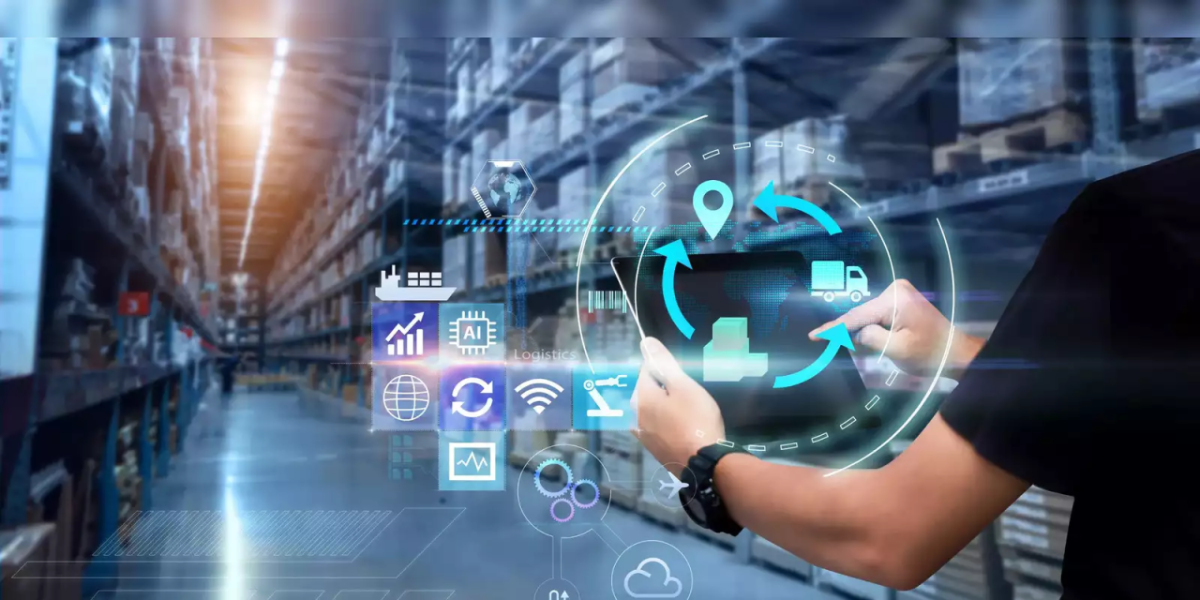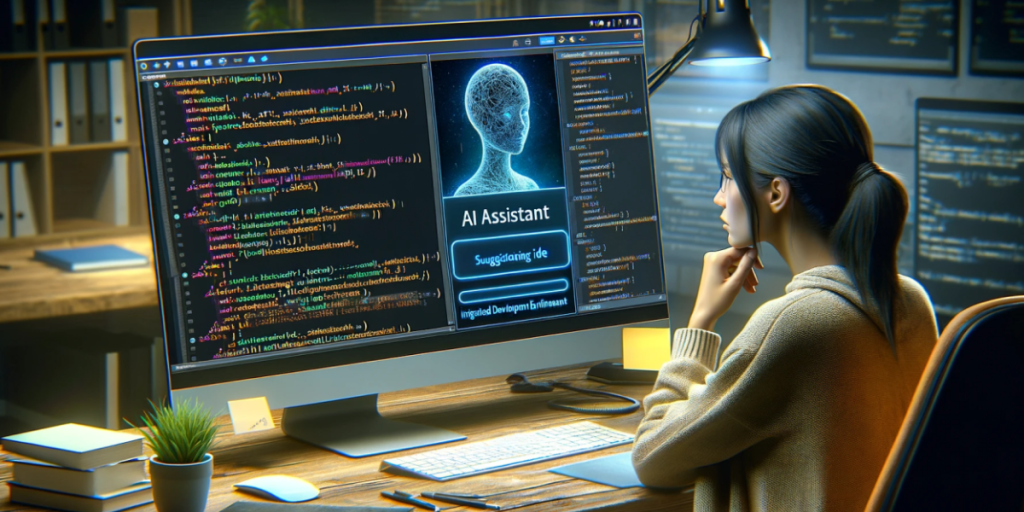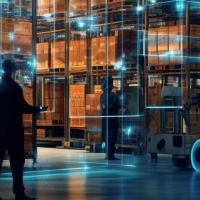In a constantly changing globalized world, technology is changing sectors at a rapid pace. Logistics and the supply chain sector aren’t the only ones to be affected by this transformation to digital. Many think of artificial Intelligence (AI) with bots, chatbots, and automated processes. As globalization has increased and with the rapid growth of online commerce, this industry is becoming more complicated and requires more efficient and effective management methods. AI And Logistics completely revolutionized how companies manage their business operations in recent years.
By incorporating AI within logistics, the cost of operations can be significantly reduced through increased efficiency and smooth operations. It is not an exaggeration to say that customer experience isn’t confined to the web and is crucial in managing supply chain logistics and logistics. This is possible only by transforming the digital process. Automating processes decreases the chance of mistakes and delays and aids with predictive analysis that can improve the process.
This blog will discuss how AI is taking over the world and the amazing opportunities and possibilities it will likely bring in logistics shortly.
What Is The Impact Of AI In The Logistic Sector?
In the face of changing consumer demands, the digitalization of processes has become essential to ensure efficient logistical operation. Artificial intelligence (AI)-driven supply chain management could fill any gaps and speed up efficiency between procuring raw materials and continuing delivery of the final product.
Predictive Analysis
Forecasting demand using previous data will help to maintain the supply and streamline processes, which could transform the logistics industry. AI can conduct this analysis across different levels and over time. In addition, processing a vast volume of data with machine learning and other methods guarantees that the error rate is under 1% and that human labor is more efficient. Optimizing supply chains through AI and analytics could aid in avoiding risks and making predictions for improved profit.
By utilizing predictive analysis, it is now possible to make strategic plans for shipments via optimal routes, making the entire process much easier. By making informed choices, the various modes of transport could be considered and improved for greater outcomes.
Computer Vision
A computer vision system based on AI is a machine-learning technique that allows the AI to classify and separate the products for damage and faults, categorize them, and much more. Combining cameras and computers and processing them as the human brain coordinates for processing are the foundation of this method. It can also separate and classify inventory according to size, weight, and other factors. It can also assist in speedily moving and removing boxes with robots inside warehouses. Additionally, using the assistance of AI automation, these activities save both time and human labor.
Autonomous Vehicles
Through AI technologies used in the trucking industry, delivery can be completed quickly since AI systems can assist in determining the fastest and most efficient routes to the destinations. The risk of damage to the package can be reduced since it can analyze the information quickly and efficiently and intelligently handle operations, thereby improving efficiency and experience. Security features are in the process of being designed and test-driven.
Big Data
The value of data is in every business. The same is true in logistical processes, too. However, vast amounts of required data can efficiently and effectively use AI for logistics. A thorough analysis can assist you in remaining ahead of the pack and preparing for anticipated risks like severe weather warnings. It is only possible to do so and process it with massive data analytics.
The Current Progress Of AI In Logistics
Incorporating AI (AI) in logistical and supply chain processes transforms the business, improving efficiency, accuracy, and the speed of response. Let’s take a look at how AI is being used to enhance different aspects of supply logistics and chain management:
Robotics And Automation
The adoption of robotics and automatization in supply chain management and logistics is increasing, drastically improving the efficiency of operations. Automated warehouses, conveyors, robots, and other equipment simplify the process of sorting, packing, and sorting. They are operational continuously, cutting labor expenses and increasing production speed.
Robotics can also be essential in repetitive tasks, allowing human workers to concentrate on more intricate and strategic actions. For example, robot arms quickly and efficiently handle packages. Likewise, automatic-driven vehicles (AGVs) efficiently transport goods in distribution centers and warehouses. Automatization not only boosts productivity but also decreases the chance of human errors and ensures more stable and quicker fulfillment of orders.
IoT Devices
The Internet of Things (IoT) transforms supply chain management and monitoring visibility. IoT devices fitted with sensors and linked to the Internet can provide instantaneous information on different aspects of the supply chain. They can track inventories, keep track of the position and status of products during transport, and help optimize the delivery route.
Smart shelves, for example, fitted with sensors for weight can instantly notify managers that they need to replenish their inventory. GPS-connected IoT equipment on trucks can give real-time updates on their exact location and estimated arrival time, which allows for better planning and coordination. Continuous data flow from IoT devices will enable companies to take proactive actions that improve efficiency and reactivity.
Autonomous Vehicles
These vehicles could change the way logistics is conducted. Autonomous delivery drones and self-driving trucks are becoming increasingly viable and could dramatically reduce labor costs and speed up delivery times. Autonomous vehicles operate continuously without needing rest breaks, resulting in quicker and more reliable delivery.
They’re equipped with sophisticated technology for navigation and AI algorithms to improve routes, reduce traffic congestion, and guarantee timely delivery. The technology can also enhance security by decreasing the chance of human errors. As the regulatory frameworks and technology become more advanced, autonomous vehicles will likely expand and transform logistical operations.
Benefits If Implementing AI In Logistics
To the uninitiated, AI has revolutionized the logistics industry. Let’s examine the main benefits of AI Logistics Solutions.
Cost Reduction
The ability of AI to automate tasks and improve processes can lead to substantial cost savings. In reducing human errors while improving efficiency and maximizing their routes, businesses can reduce operating costs and ultimately contribute to more significant profitability margins. Intelligent automated processes operate with no errors over long periods and reduce the frequency of errors and incidents between customer services and the warehouse. Thanks to their improved speed and precision, warehouse robots can be much more efficient.
Enhanced Visibility And Transparency
AI-powered solutions offer real-time insight across the entire supply chain. They allow companies to monitor shipments, track inventory levels, and pinpoint the possibility of bottlenecks. This increased transparency increases efficiency and provides quick solutions to any unexpected issues.
Improved Customer Experience
They are incorporating AI to improve logistics, resulting in faster and more accurate delivery. Live real-time tracking, effective route optimization, and precise demand forecasting create seamless customer experiences. Satisfied customers are more likely to turn into frequent customers, which can lead to long-term relationships with them.
Risk Mitigation
AI’s predictive analytics abilities aid in recognizing and reducing possible risks within the supply chain. They can predict disruptions caused by natural catastrophes, political turmoil, or issues with suppliers. AI enables organizations to develop strategies and plans to limit the effects of unexpected incidents.
Better Transportation Prediction
Transportation forecasting is among the most exciting technologies that CEOs consider thrilling, and machine learning algorithms are increasingly being employed in anticipation of the prices of the logistic market and how much capacity will soon be available for transporters, modes, and lanes. It essentially assists in planning your future requirements for shipping capacity.
In simple terms, you can be proactive in arranging accommodations at an affordable cost by accumulating huge amounts of data on market conditions from every possible point of contact in the value chain (a job that becomes simpler and less difficult to accomplish as you become more focused on integrating supply chains). The period for determining the most efficient transportation options when using the standard transportation planning workflow only takes a couple of days following the time an order has been placed.
Timeless Delivery
AI-powered systems can help decrease the need for manual effort, resulting in quicker, safer, more secure, and more efficient overall processes. This helps deliver on the promise of quick delivery to customers. The traditional warehouse process is speeded up by automated technology using minimal effort to meet delivery deadlines.
Developments Between AI And Logistics You Should Look Forward 2024
The ingenuity AI can bring to logistics is essential. Therefore, new ideas are created, developed, and implemented each year to determine ways to streamline logistics. These are the future trends that AI and logistics will have in store.
Broad Adoption Of Collaborative Logistics
Collaborative logistics is the term used to describe adopting IoT, open data, and AI technology. The term is taken from “horizontal collaboration,” a concept that permits logisticians working on identical supply chain chains to collaborate. They may collaborate on routes and vehicles, warehouses, or hubs. The sharing of these resources optimizes supply chains and reduces the number of empty trips.
The idea is that it will be more sustainable for delivery of more products faster. AI can be a key enabler and driver in making this happen. For horizontal collaboration at the global or city scale, there are a variety of AI strategies and simulating analyses.
Adopting AI To Drones Technology
Although drones were used earlier in logistical operations, they were primarily utilized for military reasons. Drone corridors are set to become the center in the future. Drone technology adoption will reduce shipping and transport costs associated with logistics. The main obstacles to adopting drone technology are the limitations of storage on drones and the necessity for more persons with technological knowledge. Also, the expertise to use drones in the quest to create drones that could carry more items that are less dependent on humans is a field where AI could be a significant factor. Although security and regulations hinder the large-scale adoption of drones powered with AI in logistics, this will likely increase later.
Blockchain Technology
AI is anticipated to be incorporated into blockchains to make the logistics infrastructure safer and more transparent. Contrary to what is commonly believed, blockchain’s capabilities aren’t limited to cryptocurrencies. Blockchain is a “decentralized public ledge which chronicles changes in real-time.” It can identify a more efficient process that guarantees faster supply. This also decreases the number of steps associated with the supply chain, eliminating the requirement to use multiple intermediaries.
Blockchain checks the partnership between logistics companies and merchants by establishing contracts and notifying each party that requirements are met. Thus, blockchain can increase the transparency of key players in the field, in addition to the delivery procedure, and identify the individual who handled the task along with the timestamp of every function. Additionally, it enhances security by using a hash algorithm that functions as individuals’ fingerprints. Additionally, it can analyze the data and create programs and predictions based on previous data to determine why supply chains can be inefficient.
Development Of Smart Roads
AI will help logistical companies by creating intelligent roads. Smart roads incorporate solar panels and sensors with AI and massive data to enhance visibility, connect to autonomous vehicles, keep track of conditions, etc. This helps the logistics industry tremendously since it improves security for the transport of products.
Solar panels and LED lighting placed on roads generate a large amount of heat and energy that prevents the roads from becoming slippery in winter. They also inform motorists about changing roads in advance and advise them to use a more efficient alternative. The lights are also equipped with fiber optic sensors that analyze traffic patterns and can detect obstructions caused by road accidents.
AI-Powered Decision-Making In Logistics
AI is A broad area that allows machines to emulate human-like intelligence. Its subset, machine learning (ML), which can help machines understand data without explicit programming, has revolutionized the logistics industry. Although AI comprises rule-based and skilled technology, ML is particularly adept in tasks requiring data analysis and pattern recognition, like demand forecasting and routing optimization. By integrating various AI tools, logistics experts can improve their decision-making process and efficiency and develop new solutions.
Predictive Analytics
It is a vital component of AI applications for logistics. Predictive analytics can accurately forecast the near future using historical data and incorporating external variables such as market trends and seasonal changes. This ability is vital to forecasting demand. Forecasting future demand patterns aids in optimizing stocks, eliminating inventory levels, and minimizing surplus stock. Predictive analytics can also be crucial in predicting supply chain disruptions, such as equipment breakdowns or delays.
Natural Language Processing (NLP)
Natural Language Processing (NLP) is a significant AI technology in logistics. NLP-powered chatbots can effectively respond to customer queries, delivering instant answers while freeing human employees to focus on more complicated tasks. Furthermore, NLP helps bridge language barriers to global logistics, ensuring clear and precise communication between countries and languages. This improves the customer experience and the efficiency of international supply chains.
Machine Learning (ML)
Machine Learning (ML) can automate various logistics processes, from route optimization to forecasting demand. By analyzing vast amounts of data, Machine learning algorithms can identify trends and patterns humans would otherwise miss, leading to increased accuracy and efficiency when making decisions. For optimization of routes, ML can process real-time information about traffic along with weather and delivery times to identify which routes are most effective, cutting delivery time and fuel consumption. When forecasting demand, ML models can predict the demand for the coming year based on past statistics on sales, market trends, and other factors. This allows for better decision-making and better allocation of resources.
Integrating AI Technologies
The application of predictive analytics, NLP, and ML tools provides logisticians with relevant data to aid in using data to make informed decisions. They complement the human experience by enhancing problem-solving capabilities and promoting development. For example, a logistics director can utilize predictive analytics to predict demands, NLP to communicate effectively with clients and partners, and ML to enhance the delivery route, all simultaneously in a coordinated way. This approach ensures logistics operations become more efficient and responsive to disruptions.
Enhancing Human Expertise
AI doesn’t replace human knowledge; it just enhances it. Automating repetitive jobs and gaining deep insight through information, AI allows logistics professionals to concentrate on strategic decision-making and more complex problems. The synergy of AI and human brainpower is the reason for continuous innovation in logistics operations. In this case, AI can handle the demands of a forecasting process with a lot of data. Human specialists interpret these forecasts and make essential decisions regarding logistics management, inventory management, and planning supply chain operations.
These tools help logistics professionals access actionable information, which can be used to make data-based decisions. Additionally, AI complements human expertise, improving problem-solving and creativity.
Conclusion
The future of AI In Transportation And Logistics certainly looks promising. With the usage examples discussed earlier, it is only a matter of time before we imagine how it could develop further over the years to come. Even though we’ve got a massive list of applications and benefits, it is essential not to be enticed by them because knowing about the negatives is also crucial.
If we look ahead, quantum computing may bring about transformational changes. It can address complex challenges that go beyond the capabilities of conventional computers. Also it can provide in-depth fleet optimization and the simulation of intricate supply chain networks. It will focus on using technology to build inclusive and sustainable supply chains.
A different area of opportunity is empowering your employees with exciting new positions to help drive digital transformation and improve outcomes in logistical processes and the whole supply chain. A significant investment is needed to improve processes, adopt new technology, and support the emergence of new capabilities and roles to adapt to and keep up-to-date with changing requirements in your supply chain.

























